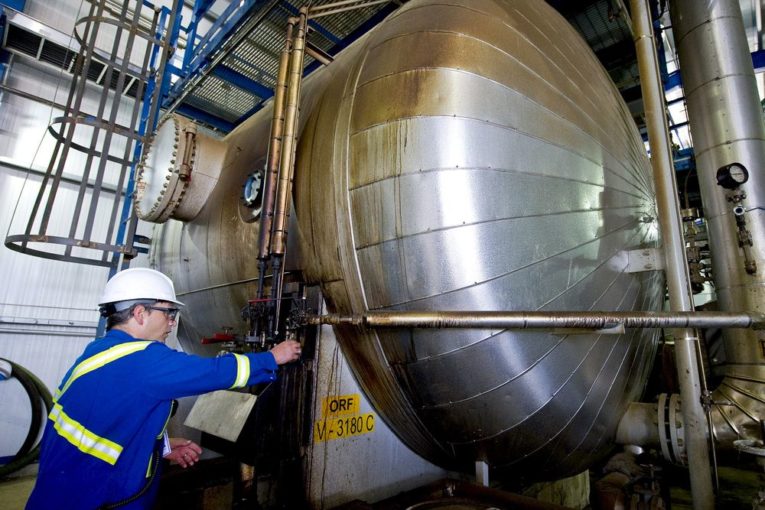
Several hours after Devon Energy Corp. signalled it will exit the oilsands business, the Alberta government touted a new $2-billion petrochemical development near Grande Prairie.
The two events aren’t connected.
Yet, they are symptomatic of the times we’re now in, where it’s difficult for Alberta to keep existing international players in the oilsands, while the government plays an increasingly activist role — opening the province’s pocketbook — to attract private investment.
And there are no signs it’s letting up.
Oklahoma-based Devon Energy announced late Tuesday it is looking to sell all of its Canadian oil assets, including the company’s Jackfish thermal oilsands project.
The independent U.S. producer pumps out about 121,000 barrels per day (bpd) from Canada. The assets are likely worth between $3.5 billion and $5 billion, according to analyst Jon Morrison of CIBC World Markets.
Devon is examining a potential sale or a spinoff as it seeks to transform the company “to a high-return U.S. oil growth business.”
Quite simply, the oilsands don’t fit. And with that, another international oil producer is leaving Canada behind.
“They are one of the last standouts of American investors selling out assets,” said Rafi Tahmazian, a senior portfolio manager at Canoe Financial.
“This is just the back end of a trend.”
Devon, which has 750 employees in Canada, entered the country two decades ago, along with a wave of other U.S. players.
It acquired Northstar Energy Corp. in 1998, followed it up with the blockbuster $7.1-billion purchase of Anderson Exploration Ltd., and began producing bitumen in 2007.
Now, it’s getting ready to sell.
Not all of this can be pinned on the chronic energy issues facing Canada today — such as ongoing pipeline constraints — but they also can’t be ignored, particularly when companies such as Devon have other opportunities to chase.
Devon is also looking to sell its Barnett Shale assets in the U.S. as it focuses on four main basins, including the prolific Eagle Ford and Powder River developments.
“We are not going to give this (oilsands) asset away, this is a high-quality asset,” Devon CEO Dave Hager said on a conference call with analysts.
“Assets like this don’t come to the market everyday.”
No, they don’t.
But such a sell-off has happened far too often in recent years as foreign producers have left Canada for superior returns elsewhere.
Although the trend started with the oil-price collapse, the exodus accelerated in 2017 as international players shed more than $30 billion of assets.
Producers such as Royal Dutch Shell, Marathon Oil, Statoil and ConocoPhillips all sold off oilsands properties, while domestic firms such as Canadian Natural Resources and Cenovus Energy emerged as buyers.
Although the oilsands sector is profitable, a litany of headwinds face the industry today: a lack of transportation capacity, volatile price differentials for heavy crude, temporary government-imposed curtailment, tepid investor interest and concerns about Canada’s competitiveness.
After more than a decade of explosive growth, oilsands capital spending is expected to fall for a fifth straight year, according to the Canadian Association of Petroleum Producers.
It’s also telling that after Husky Energy launched a hostile $6.4-billion takeover bid for intermediate oilsands producer MEG Energy last year, no rival bidders showed up, and Husky later walked away.
Analysts say Devon’s Jackfish asset is attractive, but the company’s Canadian unit won’t come cheap.
“It’s not a great time to sell an oilsands asset because of all of the concerns over curtailment and pipelines,” said Mark Oberstoetter of energy consultancy Wood Mackenzie.
“There’s a low number of natural buyers, but we continue to hear about people sniffing around and looking. And the fact is, there are not many assets that produce at this amount … so it will be a good test.”
Morrison believes the logical buyers would be a Canadian-based oilsands producer — such as Imperial Oil, Husky Energy, Suncor Energy and Canadian Natural Resources — while the lack of oil-takeaway capacity will diminish interest from outside Canada.
As Devon’s departure plays out, the provincial government was busy touting a new petrochemical project near Grande Prairie.
Calgary-based Nauticol Energy previously signalled it intends to build a $2-billion methanol manufacturing plant south of the city. The province announced Wednesday it will provide the company with $80 million in royalty tax credits to kick-start the investment.
A final investment decision is expected by the first quarter of 2020.
Once fully built, Nauticol would turn 300 million cubic feet of gas per day into three million tonnes of methanol annually, which is used in fuels, electronics and other petrochemical products.
The province’s assistance is “critically important” for the project to go ahead, said Nauticol CEO Mark Tonner.
“It helps to get Alberta able to go toe-to-toe with other jurisdictions in the world,” he said.
On the eve of an election, the Notley government has been making a flurry of similar announcements as it’s willing to provide up to $2.1 billion in grants, loan guarantees, and royalty credits to petrochemical developments and natural gas midstream projects.
“There’s definitely international players that are coming to the table with some of the projects we’re currently deliberating on,” Notley told reporters.
“We are seeing international investors understanding now that Alberta is a great place to invest.”
But the reality is international investors have long understood Alberta’s advantages, such as its large resource base, skilled workers, low taxes, a stable investment climate and the ability to get a decent return on investment.
The long-term goal should be to get interest back into the entire energy sector, not just areas where incentives and special attention are required.
Otherwise, there will be more international players like Devon leaving, with only a handful looking to come in.
Chris Varcoe is a Calgary Herald columnist.
You can read more of the news on source
